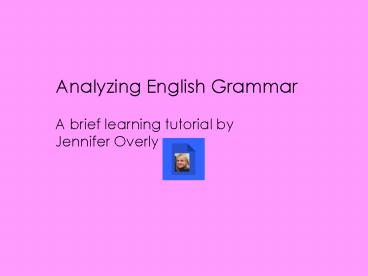Analyzing English Grammar - PowerPoint PPT Presentation
1 / 9
Title:
Analyzing English Grammar
Description:
Possessive: mine, yours, hers, his, ours, theirs. Demonstrative: this, these, that, those ... Possessive (whose) The antecedent refers to the. noun that the ... – PowerPoint PPT presentation
Number of Views:219
Avg rating:3.0/5.0
Title: Analyzing English Grammar
1
Analyzing English Grammar
- A brief learning tutorial by Jennifer Overly
2
Pronouns
- Pronouns can replace nouns or other pronouns.
- They are often classified as
- Personal
- Subjective I, you, he, she, it, we, you, they
- Objective me, you, her, him, it, us, you, them
- Possessive mine, yours, hers, his, ours, theirs
- Demonstrative this, these, that, those
- Interrogative who, whom, which, what
- Relative who, whom, which, what, that
- Reflexive myself, yourself,
- Indefinite all, any, many, nobody, few, another
- Intensive myself, himself, themselves
Quiz
3
Quiz
Check Answers
Continue
- Please select the appropriate pronouns.
- Example
- Like you and I/me, Abby enjoys movies and
popcorn. - Me is the appropriate choice, because both you
and me are objects of the preposition like. - 1.) When you and he/him start planning the
end-of-the-semester party, send an email to Jim
and she/her. - 2.) If he/him and she/her find out in time, they
can help decorate. - 3.) Our group will provide live music if you let
the band and I/me know the date. - 4.) Unless both he/him and I/me study this
weekend, we will have absolutely nothing to
celebrate. - 5.) Abby is going to ask you and she/her whether
she is invited to the party.
4
Relative Clauses
- How poor are
- they who have
- not patience.
- Shakespeare
- www.gettyimages.com
- Relative clauses give essential
- information to help identify a
- particular person or thing.
- Commas are not used in
- defining relative clauses.
- There are three cases for
- relatives
- Subjective (who, that, which)
- Objective (who, whom, that, which, where, when,
why) - Possessive (whose)
- The antecedent refers to the
- noun that the relative stands for
- in the clause.
- Ex. An English student is someone who studies
literature.
Quiz
5
Quiz
- Combine the set of simple sentences into a single
- sentence, using a relative. You may change the
order of - the clauses.
English tourists like to visit the Riviera. The
Riviera is warmer and sunnier than England. We
want to get rid of the bookshelf. Uncle George
gave us the bookshelf.
Check Answers
Continue
6
Sentence Types
- Type One Uses an intransitive verb and an
optional adverb phrase. - Ex. Emily runs around the house.
- Type Two Uses a linking verb, often the verb to
be with a required adverb phrase. - Ex. Emily is running around the house.
- Type Three Uses a linking verb and requires an
adjective phrase. - Ex. Emily is happy to run around the house.
- Type Four Uses a linking verb and requires a
noun phrase that refers back to the subject. - Ex. Emily is a runner.
- Type Five Uses a transitive verb and requires a
noun phrase different from the subject of the
sentence. - Ex. Emily enjoys running.
- Ex. The dog ate the treat.
Quiz
7
Quiz
Check Answers
Continue
- Write a Type Five sentence using the verb to
dance. - Write a Type Three sentence using the verb to
seem. - Write a Type Four sentence using the verb to
be.
8
Any Questions?
Archive
- Getty Images http//creative.gettyimages.com/sour
ce/classes/FrameSet.aspx?UQRhnybmtpk4sourcef
rontlightboxView1txtSearchgrammarselImageType
7chkLicensedonchkRoyaltyFreeonchkNLMon
9
Curriculum Vitae
Back to Tutorial
- Education Silverado High School
- Graduated June 2002
- University of Nevada, Reno
- English Major, Journalism Minor
- Attending Years August 2002-December 2004
- University of Nevada, Las Vegas
- B.A. in English
- Graduated December 2006
- University of Nevada, Las Vegas
- Graduate Licensure Program (GLP)
- Estimated Graduation Date Fall 2008
- Relevant Work Experience UNLV Writing Center
Consultant - August 2006-Present
- Contact Dr. Patrice Hollrah (702) 895-3908































